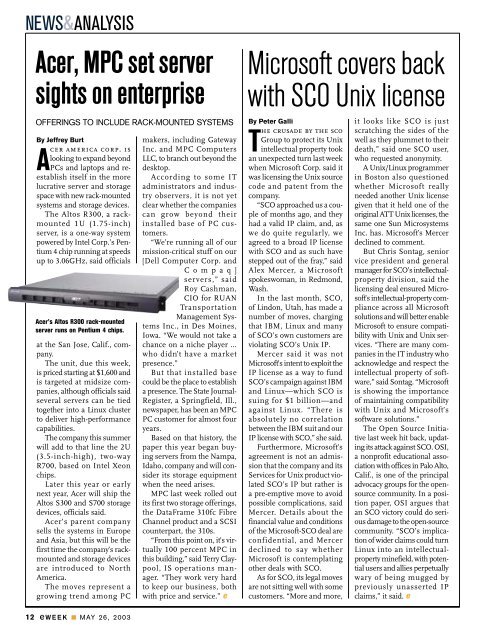Cisco - TABPI
Cisco - TABPI
Cisco - TABPI
You also want an ePaper? Increase the reach of your titles
YUMPU automatically turns print PDFs into web optimized ePapers that Google loves.
NEWS&ANALYSIS<br />
Acer, MPC set server<br />
sights on enterprise<br />
OFFERINGS TO INCLUDE RACK-MOUNTED SYSTEMS<br />
By Jeffrey Burt<br />
Acer america corp. is<br />
looking to expand beyond<br />
PCs and laptops and reestablish<br />
itself in the more<br />
lucrative server and storage<br />
space with new rack-mounted<br />
systems and storage devices.<br />
The Altos R300, a rackmounted<br />
1U (1.75-inch)<br />
server, is a one-way system<br />
powered by Intel Corp.’s Pentium<br />
4 chip running at speeds<br />
up to 3.06GHz, said officials<br />
Acer’s Altos R300 rack-mounted<br />
server runs on Pentium 4 chips.<br />
at the San Jose, Calif., company.<br />
The unit, due this week,<br />
is priced starting at $1,600 and<br />
is targeted at midsize companies,<br />
although officials said<br />
several servers can be tied<br />
together into a Linux cluster<br />
to deliver high-performance<br />
capabilities.<br />
The company this summer<br />
will add to that line the 2U<br />
(3.5-inch-high), two-way<br />
R700, based on Intel Xeon<br />
chips.<br />
Later this year or early<br />
next year, Acer will ship the<br />
Altos S300 and S700 storage<br />
devices, officials said.<br />
Acer’s parent company<br />
sells the systems in Europe<br />
and Asia, but this will be the<br />
first time the company’s rackmounted<br />
and storage devices<br />
are introduced to North<br />
America.<br />
The moves represent a<br />
growing trend among PC<br />
12 eWEEK n MAY 26, 2003<br />
makers, including Gateway<br />
Inc. and MPC Computers<br />
LLC, to branch out beyond the<br />
desktop.<br />
According to some IT<br />
administrators and industry<br />
observers, it is not yet<br />
clear whether the companies<br />
can grow beyond their<br />
installed base of PC customers.<br />
“We’re running all of our<br />
mission-critical stuff on our<br />
[Dell Computer Corp. and<br />
Compaq]<br />
servers,” said<br />
Roy Cashman,<br />
CIO for RUAN<br />
Transportation<br />
Management Systems<br />
Inc., in Des Moines,<br />
Iowa. “We would not take a<br />
chance on a niche player ...<br />
who didn’t have a market<br />
presence.”<br />
But that installed base<br />
could be the place to establish<br />
a presence. The State Journal-<br />
Register, a Springfield, Ill.,<br />
newspaper, has been an MPC<br />
PC customer for almost four<br />
years.<br />
Based on that history, the<br />
paper this year began buying<br />
servers from the Nampa,<br />
Idaho, company and will consider<br />
its storage equipment<br />
when the need arises.<br />
MPC last week rolled out<br />
its first two storage offerings,<br />
the DataFrame 310fc Fibre<br />
Channel product and a SCSI<br />
counterpart, the 310s.<br />
“From this point on, it’s virtually<br />
100 percent MPC in<br />
this building,” said Terry Claypool,<br />
IS operations manager.<br />
“They work very hard<br />
to keep our business, both<br />
with price and service.” ´<br />
Microsoft covers back<br />
with SCO Unix license<br />
By Peter Galli<br />
The crusade by the sco<br />
Group to protect its Unix<br />
intellectual property took<br />
an unexpected turn last week<br />
when Microsoft Corp. said it<br />
was licensing the Unix source<br />
code and patent from the<br />
company.<br />
“SCO approached us a couple<br />
of months ago, and they<br />
had a valid IP claim, and, as<br />
we do quite regularly, we<br />
agreed to a broad IP license<br />
with SCO and as such have<br />
stepped out of the fray,” said<br />
Alex Mercer, a Microsoft<br />
spokeswoman, in Redmond,<br />
Wash.<br />
In the last month, SCO,<br />
of Lindon, Utah, has made a<br />
number of moves, charging<br />
that IBM, Linux and many<br />
of SCO’s own customers are<br />
violating SCO’s Unix IP.<br />
Mercer said it was not<br />
Microsoft’s intent to exploit the<br />
IP license as a way to fund<br />
SCO’s campaign against IBM<br />
and Linux—which SCO is<br />
suing for $1 billion—and<br />
against Linux. “There is<br />
absolutely no correlation<br />
between the IBM suit and our<br />
IP license with SCO,” she said.<br />
Furthermore, Microsoft’s<br />
agreement is not an admission<br />
that the company and its<br />
Services for Unix product violated<br />
SCO’s IP but rather is<br />
a pre-emptive move to avoid<br />
possible complications, said<br />
Mercer. Details about the<br />
financial value and conditions<br />
of the Microsoft-SCO deal are<br />
confidential, and Mercer<br />
declined to say whether<br />
Microsoft is contemplating<br />
other deals with SCO.<br />
As for SCO, its legal moves<br />
are not sitting well with some<br />
customers. “More and more,<br />
it looks like SCO is just<br />
scratching the sides of the<br />
well as they plummet to their<br />
death,” said one SCO user,<br />
who requested anonymity.<br />
A Unix/Linux programmer<br />
in Boston also questioned<br />
whether Microsoft really<br />
needed another Unix license<br />
given that it held one of the<br />
original ATT Unix licenses, the<br />
same one Sun Microsystems<br />
Inc. has. Microsoft’s Mercer<br />
declined to comment.<br />
But Chris Sontag, senior<br />
vice president and general<br />
manager for SCO’s intellectualproperty<br />
division, said the<br />
licensing deal ensured Microsoft’s<br />
intellectual-property compliance<br />
across all Microsoft<br />
solutions and will better enable<br />
Microsoft to ensure compatibility<br />
with Unix and Unix services.<br />
“There are many companies<br />
in the IT industry who<br />
acknowledge and respect the<br />
intellectual property of software,”<br />
said Sontag. “Microsoft<br />
is showing the importance<br />
of maintaining compatibility<br />
with Unix and Microsoft’s<br />
software solutions.”<br />
The Open Source Initiative<br />
last week hit back, updating<br />
its attack against SCO. OSI,<br />
a nonprofit educational association<br />
with offices in Palo Alto,<br />
Calif., is one of the principal<br />
advocacy groups for the opensource<br />
community. In a position<br />
paper, OSI argues that<br />
an SCO victory could do serious<br />
damage to the open-source<br />
community. “SCO’s implication<br />
of wider claims could turn<br />
Linux into an intellectualproperty<br />
minefield, with potential<br />
users and allies perpetually<br />
wary of being mugged by<br />
previously unasserted IP<br />
claims,” it said. ´













